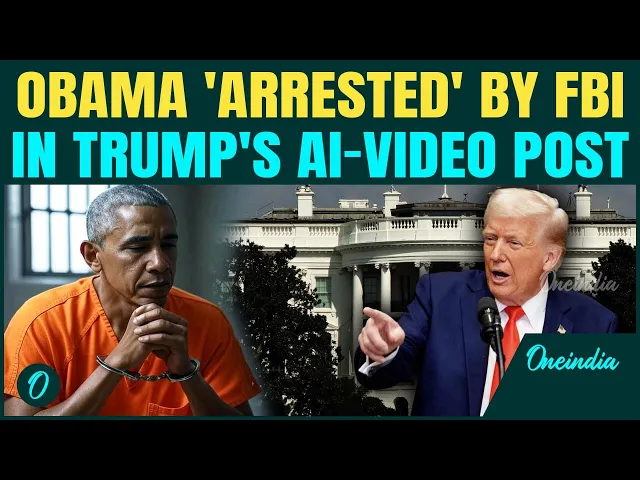Obama in Handcuffs? Trump Posts AI Video of Obama ARRESTED |Biden, Obama Face Election Rigging Trial

AI deepfakes poised to disrupt 2024 elections
In an alarming development at the intersection of artificial intelligence and politics, former President Donald Trump shared a fabricated video depicting former President Barack Obama in handcuffs, supposedly being arrested alongside President Biden for "election rigging." The completely manufactured content, created using AI tools, represents a disturbing escalation in the use of synthetic media in political discourse as we approach the critical 2024 election cycle. What makes this incident particularly noteworthy is not just the content itself, but the timing and the implications for voter trust in an already fractured information landscape.
-
Weaponized AI in politics: Trump's sharing of a deepfake video showing political opponents under arrest demonstrates how AI-generated content is actively being deployed by high-profile figures to create false narratives that can potentially influence public opinion.
-
Platform vulnerabilities exposed: Despite Meta's stated policies against misleading AI content, the video remained accessible across social media platforms, highlighting significant gaps in content moderation systems for synthetic media.
-
Historical pattern of behavior: This incident follows a consistent pattern where Trump has previously shared other AI-generated images, including fabricated endorsements from Taylor Swift and false scenes of himself with Black voters, indicating a strategic approach to using synthetic media.
-
Erosion of truth in political discourse: The video's circulation exemplifies how AI tools are making it increasingly difficult for voters to distinguish between authentic and manufactured content, potentially undermining the very foundation of informed democratic participation.
-
Inadequate regulatory frameworks: The incident underscores the absence of comprehensive legal guidelines for addressing AI-generated political content, leaving platforms to navigate complex moderation decisions without clear standards.
The most concerning aspect of this development is how rapidly AI-generated political content has evolved from novelty to weaponized tool. Just months ago, discussions about the potential dangers of deepfakes in politics seemed theoretical. Now, we're witnessing these fabrications being deployed by a presidential candidate with nearly 90 million followers, creating false narratives that portray political opponents as criminals. This represents a fundamental shift in how misinformation operates – from manipulated contexts and selective editing to outright manufacturing of events that never occurred.
This matters profoundly because research consistently shows that visual misinformation is significantly more persuasive and memorable than text alone. The human brain
Recent Videos
How To Earn MONEY With Images (No Bullsh*t)
Smart earnings from your image collection In today's digital economy, passive income streams have become increasingly accessible to creators with various skill sets. A recent YouTube video cuts through the hype to explore legitimate ways photographers, designers, and even casual smartphone users can monetize their image collections. The strategies outlined don't rely on unrealistic promises or complicated schemes—instead, they focus on established marketplaces with proven revenue potential for image creators. Key Points Stock photography platforms like Shutterstock, Adobe Stock, and Getty Images remain viable income sources when you understand their specific requirements and optimize your submissions accordingly. Specialized marketplaces focusing...
Oct 3, 2025New SHAPE SHIFTING AI Robot Is Freaking People Out
Liquid robots will change everything In the quiet labs of Carnegie Mellon University, scientists have created something that feels plucked from science fiction—a magnetic slime robot that can transform between liquid and solid states, slipping through tight spaces before reassembling on the other side. This technology, showcased in a recent YouTube video, represents a significant leap beyond traditional robotics into a realm where machines mimic not just animal movements, but their fundamental physical properties. While the internet might be buzzing with dystopian concerns about "shape-shifting terminators," the reality offers far more promising applications that could revolutionize medicine, rescue operations, and...
Oct 3, 2025How To Do Homeless AI Tiktok Trend (Tiktok Homeless AI Tutorial)
AI homeless trend raises ethical concerns In an era where social media trends evolve faster than we can comprehend them, TikTok's "homeless AI" trend has sparked both creative engagement and serious ethical questions. The trend, which involves using AI to transform ordinary photos into images depicting homelessness, has rapidly gained traction across the platform, with creators eagerly jumping on board to showcase their digital transformations. While the technical process is relatively straightforward, the implications of digitally "becoming homeless" for entertainment deserve careful consideration. The video tutorial provides a step-by-step guide on creating these AI-generated images, explaining how users can transform...
